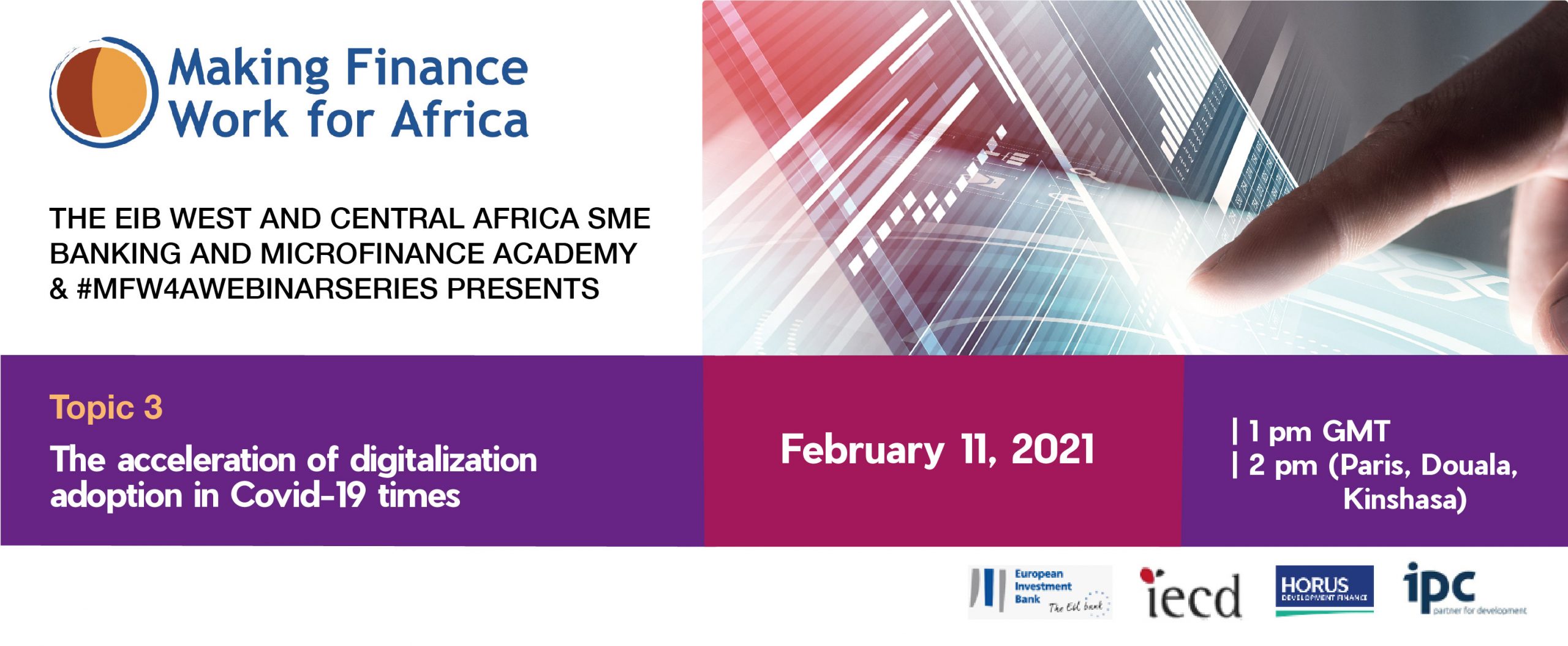The EIB West and Central Africa SME Banking and Microfinance Academy 2020-2021
Webinar series Topic 3: The acceleration of digitalization adoption in covid-19 times
11 Février 2021, 01 pm (Abidjan) / 02 pm (Cotonou, Paris, Frankfurt, Douala, Kinshasa)
The third in a series of four webinars organized by the EIB Academy dedicated to SME finance banks and microfinance in West and Central Africa, in partnership with Making Finance Work for Africa (MFW4A), was held on February 11, 2021. Its theme was “Accelerating the adoption of digitalization in times of covid-19“.
With over 200 participants, the event was well attended, reflecting the importance of this topic, especially in light of the increased demand for digital financial services.
Indeed, in the current pandemic context, customers expect financial institutions to increase communication and to adapt quickly to digital technology in order to facilitate permanent and remote access to their accounts.
Mr. Christophe Bretagnolle, a digitalization consultant, was invited to speak on how the COVID 19 crisis has accelerated the implementation of digital solutions for financial service delivery, the impact on traditional project planning, and the challenges, risks, outcomes and lessons learned from these experiences on the continent. The panelist described how, in several countries in Africa, financial institutions have sought out digitalization experts, with the intention of rapidly deploying digital solutions. He emphasized that there cannot be a standard approach, as the extent of the developments depends on the situation of each institution, especially the Core Banking System. He also emphasized that, to increase the likelihood of success of this type of project, it is important to involve all relevant operational departments from the beginning, and not just the IT department. The level of complexity and the deployment time also depend on the type of services that the institution concerned intends to deploy.
The second speaker, Olivier Bailly-Béchet, Managing Director of the microfinance institution Advans Ghana, presented his institution’s approach to the adoption of digital channels. In the Ghanaian context, with the high penetration rate of mobile money, the pandemic was an opportunity to increase its use, and the number of transactions was multiplied between 2019 and 2020. He stressed the important role played by the regulator in supporting the construction of the digital payments ecosystem. The existence of a specialized department within the central bank has been particularly instrumental. Advans Ghana is the pilot subsidiary of the Advans Group for the implementation of the digital transformation in 2021. With its Advans Innovation Map, the institution has been able to deploy a combination of digital solutions, targeting both the institution internally (change in working methods, review of the business model) and externally (focus on customer-centric solutions). The need to accelerate the movement has led the institution to integrate its solutions directly with the e-wallet of two operators rather than going through an aggregator, to launch remote subscription and reactivation procedures for digital financial services, and to reorient field agents (especially mobile cashiers) to train customers on their offer.
Finally, Willy Tchiengue, Deputy Managing Director of YUP Management (Société Générale), Senegal, shared the original approach of Yup, a solution developed by Société Générale in several African countries. Yup started its deployment some time ago, which allowed it to position itself on the market as a key player, particularly in social safety net policies in synergy with the various authorities and NGOs present in several countries (Burkina-Faso, Cameroon, Ivory Coast, Guinea, Senegal). This has been possible thanks to close collaboration with the regulators, in particular for a simplification of identification and enrolment procedures, and with post-remedial mechanisms. In parallel, Yup has deployed a Cash Collection Service for companies with a distribution network.
These solutions, already present before the crisis, have proven their usefulness and served as a catalyst in the digital ecosystem. It is noted that a purely digital-only approach is currently inappropriate in many countries, and that in these cases customers need a place to access cash at the end of the chain.
After an exchange session with the participants, the panelists shared some concluding messages, highlighting the importance for each institution to strengthen cyber security in parallel with the deployment of digital solutions.
The webinar concluded on this note. For more information on the EIB’s technical assistance program for West and Central Africa, visit our website: www.msmefinanceta.eu and subscribe to our LinkedIn page https://www.linkedin.com/company/eib-technical-assistance-programme-west-and-central-africa




